
The National Football League (NFL) is a professional American football league that consists of 32 teams, divided equally between the American Football Conference (AFC) and the National Football Conference (NFC). The NFL is one of the major professional sports leagues in the United States and Canada and the highest professional level of American football in the world. Each NFL season begins with a three-week preseason in August, followed by the 18-week regular season which runs from early September to early January, with each team playing 17 games and having one bye week. Following the conclusion of the regular season, seven teams from each conference advance to the playoffs, a single-elimination tournament that culminates in the Super Bowl, which is contested in February and is played between the winners of the AFC and NFC championship games.
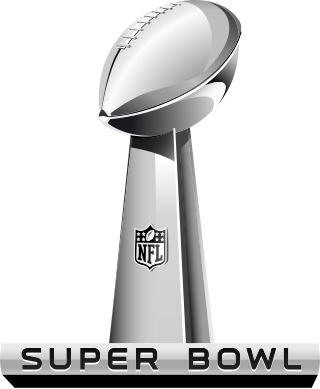
The Super Bowl is the annual league championship game of the National Football League (NFL) of the United States. It has served as the final game of every NFL season since 1966, replacing the NFL Championship Game. Since 2022, the game is played on the second Sunday in February. Prior Super Bowls were played on Sundays in early to mid-January from 1967 to 1978, late January from 1979 to 2003, and the first Sunday of February from 2004 to 2021. Winning teams are awarded the Vince Lombardi Trophy, named after the eponymous coach who won the first two Super Bowls. Due to the NFL restricting use of its "Super Bowl" trademark, it is frequently referred to as the "big game" or other generic terms by non-sponsoring corporations. The day the game is played is often referred to as "Super Bowl Sunday" or simply "Super Sunday".

Super Bowl XXXV was an American football game between the American Football Conference (AFC) champion Baltimore Ravens and the National Football Conference (NFC) champion New York Giants to decide the National Football League (NFL) champion for the 2000 season. The Ravens defeated the Giants by a score of 34–7, tied for the seventh largest Super Bowl margin of victory with Super Bowl XXXVII. The game was played on January 28, 2001, at Raymond James Stadium in Tampa, Florida, making it the first time Raymond James Stadium has held a Super Bowl.

The Hollywood Bowl is an amphitheatre in the Hollywood Hills neighborhood of Los Angeles, California. It was named one of the 10 best live music venues in the United States by Rolling Stone magazine in 2018. It was listed on the National Register of Historic Places in 2023.

John Albert Elway Jr. is an American former professional football quarterback who spent his entire 16-year career with the Denver Broncos of the National Football League (NFL). Following his playing career, he then spent 11 years with the Broncos in various front office positions, eventually being promoted to general manager. Elway, along with former backup quarterback and head coach Gary Kubiak, are the only individuals to be associated with all three of the Broncos' Super Bowl wins.

Thomas Raymond Flores is an American former professional football player in the American Football League (AFL) and coach in the National Football League (NFL). He played as a quarterback for nine seasons in the AFL, primarily with the Oakland Raiders. After his retirement as a coach, he was a radio announcer for more than twenty years.
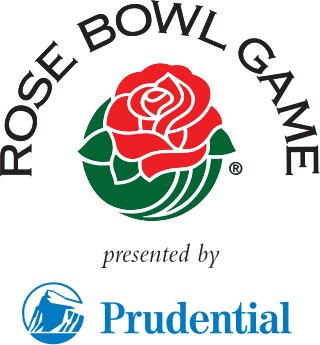
The Rose Bowl Game is an annual American college football bowl game, traditionally played on January 1 at the Rose Bowl in Pasadena, California. When New Year's Day falls on a Sunday, the game is played on Monday, January 2. Nicknamed "The Granddaddy of Them All" by broadcaster Keith Jackson, it was the first postseason football game ever established. The Rose Bowl Game was first played in 1902 as the Tournament East–West football game, and has been played annually since 1916. Since 1945, it has been the highest attended college football bowl game. The game is a part of the Pasadena Tournament of Roses Association's "America's New Year Celebration", which also includes the historic Rose Parade. Winners of the game receive the Leishman Trophy, named for former Tournament of Roses presidents, William L. Leishman and Lathrop K. Leishman who played an important part in the history of this game.
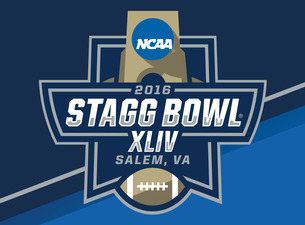
The NCAA Division III Football Championship is an American college football tournament played annually to determine a champion at the NCAA Division III level. It was first held in 1973, as a single-elimination playoff with eight teams. Over the past 50 seasons, the number of participants has grown to 32, with the current bracket size dating from 2005. In 2023, 28 playoff bids went to conference champions via automatic qualification, leaving just four places for at-large selections.
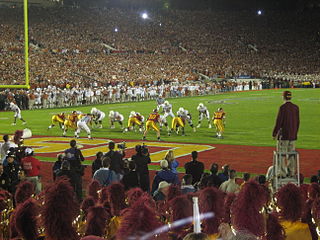
In North America, a bowl game, or simply bowl, is one of a number of postseason college football games that are primarily played by teams belonging to the NCAA's Division I Football Bowl Subdivision (FBS). For most of its history, the Division I Bowl Subdivision had avoided using a playoff tournament to determine an annual national champion, which was instead traditionally determined by a vote of sports writers and other non-players. In place of such a playoff, various cities across the United States developed their own regional festivals featuring postseason college football games. Prior to 2002, bowl game statistics were not included in players' career totals. Despite attempts to establish a permanent system to determine the FBS national champion on the field, various bowl games continue to be held because of the vested economic interests entrenched in them.

The Yale Bowl Stadium is a college football stadium in the northeast United States, located in New Haven, Connecticut, on the border of West Haven, about 1½ miles west of the main campus of Yale University. The home of the American football Yale Bulldogs team of the Ivy League, it opened in 1914 with 70,896 seats; renovations have reduced its current capacity to 61,446, still making it the second largest FCS stadium, behind Tennessee State's Nissan Stadium.

The Rose Bowl is an outdoor athletic stadium located in Pasadena, California. Opened in October 1922, the stadium is recognized as a National Historic Landmark and a California Historic Civil Engineering landmark. At a modern capacity of an all-seated configuration at 92,542, the Rose Bowl is the 16th-largest stadium in the world, the 11th-largest stadium in the United States, and the 10th-largest NCAA stadium. The stadium is 10 miles northeast of downtown Los Angeles.

The Tangier American Legation, officially the Tangier American Legation Institute for Moroccan Studies (TALIMS), is a building in the medina of Tangier, Morocco that formerly housed the United States diplomatic mission to Morocco. It was the first American public property abroad and is the only U.S. National Historic Landmark in a foreign country.

The Alabama Crimson Tide football program represents the University of Alabama in the sport of American football. The team competes in the Football Bowl Subdivision (FBS) of the National Collegiate Athletic Association (NCAA) and the Western Division of the Southeastern Conference (SEC). The team is currently led by Kalen DeBoer. The Crimson Tide is among the most storied and decorated football programs in NCAA history. Since beginning play in 1892, the program claims 18 national championships, including 13 wire-service national titles in the poll-era, and five other titles before the poll-era. From 1958 to 1982, the team was led by Hall of Fame coach Paul "Bear" Bryant, who won six national titles with the program. It was not until 2009 that an Alabama player received a Heisman Trophy, when running back Mark Ingram II became the university's first winner. In 2015, Derrick Henry became the university's second Heisman winner. The Crimson Tide won back to back Heisman trophies in 2020 and 2021, with DeVonta Smith and Bryce Young.
All-Pro is an honor bestowed upon professional American football players that designates the best player at each position during a given season. All-Pro players are typically selected by press organizations, who select an "All-Pro team," a list that consists of at least 22 players, one for each offensive and defensive position, plus various special teams players depending on the press organization that compiles the list. All-Pro lists are exclusively limited to the major leagues, usually only the National Football League; in the past, other leagues recognized as major, such as the American Football League of the 1960s or the All-America Football Conference of the 1940s, have been included in All-Pro lists.

The NCAA Division I Football Bowl Subdivision (FBS), formerly known as Division I-A, is the highest level of college football in the United States. The FBS consists of the largest schools in the National Collegiate Athletic Association (NCAA). As of the 2024 season, there are 10 conferences and 134 schools in FBS.

A national championship in the highest level of college football in the United States, currently the NCAA Division I Football Bowl Subdivision (FBS), is a designation awarded annually by various organizations to their selection of the best college football team. Division I FBS football is the only National Collegiate Athletic Association (NCAA) sport for which the NCAA does not sanction a yearly championship event. As such, it is sometimes referred to as a "mythical national championship".
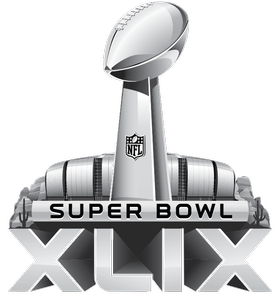
Super Bowl XLIX was an American football game played to determine the champions of the National Football League (NFL) for the 2014 season. The American Football Conference (AFC) champion New England Patriots defeated the National Football Conference (NFC) champion Seattle Seahawks, 28–24. The game was played on February 1, 2015, at University of Phoenix Stadium in Glendale, Arizona, the second Super Bowl held at the stadium and the third in the Phoenix metropolitan area.














